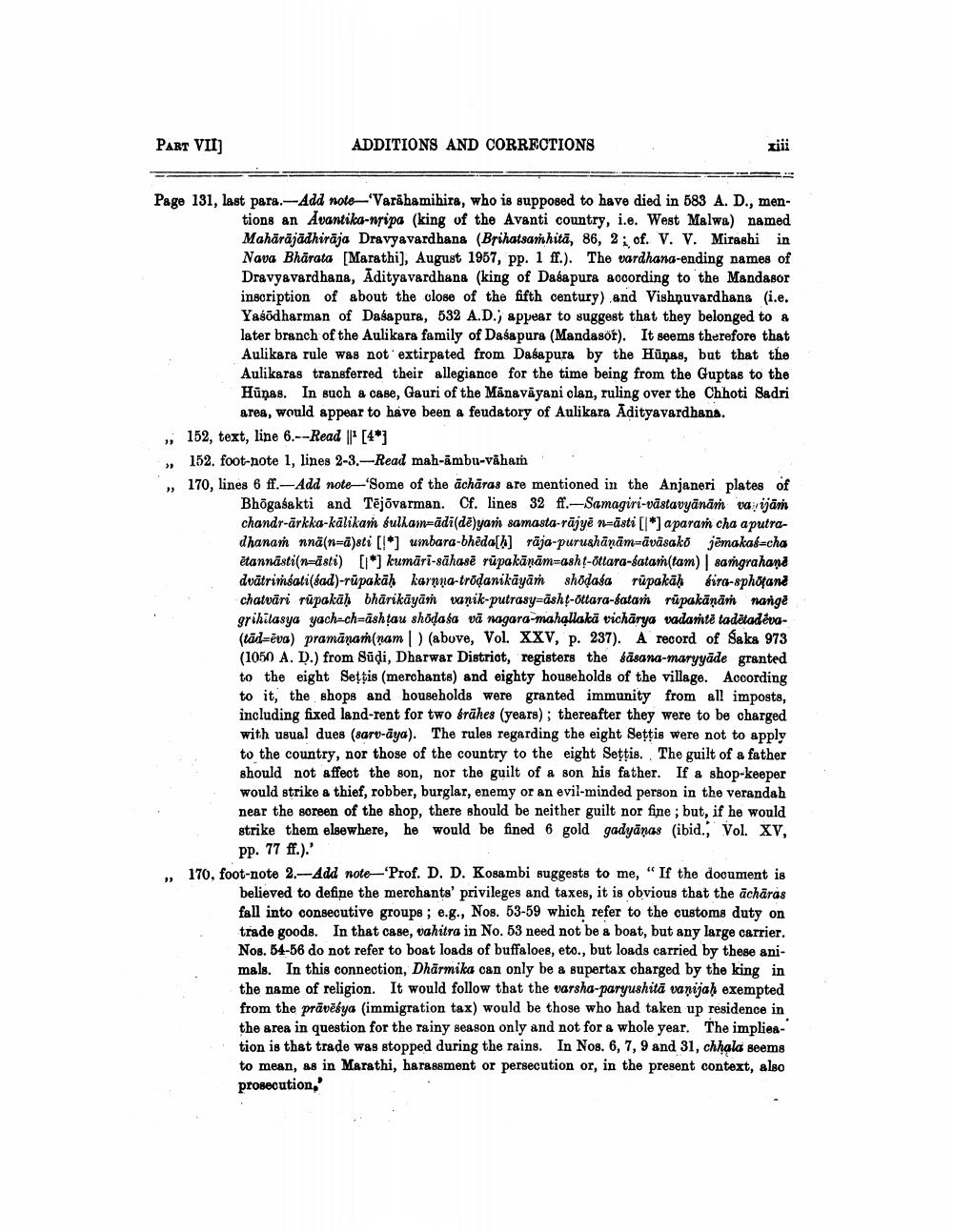________________
PART VII)
ADDITIONS AND CORRECTIONS
Page 131, last para.- Add note-Varahamihira, who is supposed to have died in 583 A. D., men
tions an Avantika-nripa (king of the Avanti country, i.e. West Malwa) named Mahārājādhirāja Dravyavardhana (Brihatsanhitā, 86, 2 of. V. V. Mirashi in Nava Bharata (Marathi), August 1957, pp. 1 ff.). The vardhana-ending names of Dravyavardhana, Adityavardhana (king of Dasapura according to the Mandasor inscription of about the close of the fifth century) and Vishnuvardhana (i.e. Yasödharman of Dasapura, 632 A.D.) appear to suggest that they belonged to a later branch of the Aulikara family of Daśapura (Mandasor). It seems therefore that Aulikara rule was not extirpated from Dasa pura by the Hüņas, but that the Aulikaras transferred their allegiance for the time being from the Guptas to the Hūņas. In such a case, Gauri of the Mänavāyani clan, ruling over the Chhoti Sadri
area, would appear to have been a feudatory of Aulikara Adityavardhana. , 152, text, line 6.--Read || [4*] » 152. foot-note 1, lines 2-3.-Read mah-ambu-vāham , 170, lines 6 ff.-Add note—'Some of the achāras are mentioned in the Anjaneri plates of
Bhõgasakti and Tējõvarman. Cf. lines 32 ff.-Samagiri-vāstavyānāṁ varijām chandr-ärkka-kālikaṁ sulham=ädi(de)yan samasta-räjyë n=āsti [l*] aparań cha aputradhanań nnā(n=ā)sti (!*] umbara-bhēda[h] rāja-purushāņām=āvāsako jēmakas-cha etannästi(n=asti) [I *) kumāri-sāhasē rūpakāņām=asht-ottara-satam(tam) saṁgrahand dvātrimsati(sad)-rūpakāḥ karnna-trödanikāyāṁ shodasa rūpakah fira-sphotand chatvāri rūpakāh bhārikāyān vanik-putrasy-asht-ottara-latar rūpakānā nange grihilasya yach-chrashtau shōdaca vā nagara-mahallakā vicharya vadaṁtë tadėtadeva(tūd=eva) pramānam (nam (above, Vol. XXV, p. 237). A record of Saka 973 (1050 A. D.) from Sūdi, Dharwar District, registers the sāsana-maryyāde granted to the eight Sețţis (merchants) and eighty households of the village. According to it, the shops and households were granted immunity from all imposts, including fixed land-rent for two brāhes (years); thereafter they were to be charged with usual dues (sarv-aya). The rules regarding the eight Seţțis were not to apply to the country, nor those of the country to the eight Settis. . The guilt of a father should not affect the son, nor the guilt of a son his father. If a shop-keeper would strike a thief, robber, burglar, enemy or an evil-minded person in the verandah near the soreen of the shop, there should be neither guilt nor fine ; but, if he would strike them elsewhere, he would be fined 6 gold gadyānas (ibid., Vol. XV,
pp. 77 ff.).' , 170, foot-note 2.-Add note'Prof. D. D. Kosambi suggests to me, "If the document is
believed to define the merchants' privileges and taxes, it is obvious that the achāras fall into consecutive groups; e.g., Nos. 53-59 which refer to the customs duty on trade goods. In that case, vahitra in No. 53 need not be a boat, but any large carrier. Nos. 54-56 do not refer to boat loads of buffaloes, eto., but loads carried by these animals. In this connection, Dharmika can only be a supertax charged by the king in the name of religion. It would follow that the varsha-paryushitā vanijah exempted from the prāvēbya (immigration tax) would be those who had taken up residence in the area in question for the rainy season only and not for a whole year. The impliestion is that trade was stopped during the rains. In Nos. 6, 7, 9 and 31, chhala seems to mean, as in Marathi, harassment or persecution or, in the present context, also prosecution,




